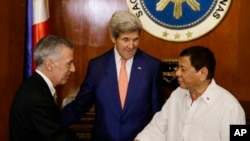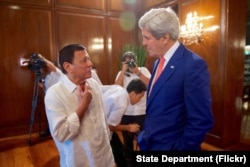The U.S. says it is encouraged by the willingness of China and the Philippines to engage in direct dialogue over the South China Sea following a tribunal ruling against Beijing earlier this month.
In Manila Wednesday, U.S. Secretary of State John Kerry met with senior Philippine officials, including new Philippines President Rodrigo Duterte. It was the first meeting between the two leaders after The Hague ruling which China objects to.
At a joint press conference with Philippines’ Foreign Affairs Secretary Perfecto Yasay, Kerry said the U.S. encourages all parties, including the Chinese and the Philippines “to negotiate, to work through this diplomatically, bilaterally, multilaterally, [and] build up confidence building measures.”
The top U.S. diplomat said China indicated its willingness and readiness to engage in bilateral negotiation with the Philippines on Tuesday, a day after Kerry met with Chinese Foreign Minister Wang Yi.
While it is seen by some as a deviation from the U.S. position, a senior State Department official said Washington has never opposed direct talks between Beijing and Manila and a bilateral talk has always been an option.
That official stressed what the U.S. opposes is using a direct negotiation between claimants as a pre-condition.
China rejects multilateral solution
China has long said it will only settle maritime territorial disputes through bilateral negotiations, rejecting calls for any multilateral solution.
Bonnie Glaser, Director of the China Power Project at the Center for Strategic and Internatonal Studies (CSIS), told VOA that Washington “has not excluded other forms of negotiations and has stressed that multilateral mechanisms should be employed as well, especially when bilateral talks prove fruitless.”
Another expert saw direct talks between Beijing and Manila as a reflection of the fact that many issues between the two countries need to be settled bilaterally.
“One such issue is how should China, which controls Scarborough Shoal, provide for the Philippines' traditional fishing rights in and around the shoal, which have now been recognized as legally valid,” said Peter Dutton from the U.S. Naval War College.
Duterte will lead a meeting with his National Security Council later Wednesday, where his meeting with Kerry and the arbitration case on maritime disputes are expected to be on the agenda.
On Tuesday, the Philippine Supreme Court upheld the constitutionality of the so-called Enhanced Defense Cooperation Agreement (EDCA) which allows for a rotation of U.S. troops on Philippine bases and other enhanced military cooperation.
Yasay, heading into his meeting with Kerry, said “this effectively resolves the last remaining legal hurdle as we recognize potential contribution of EDCA to the preservation of peace and stability in the region.”
He added the Philippines is ready to strengthen military cooperation with the United States.
“And even when there are times of tension and stress, as we’ve seen over the questions in the South China Sea or otherwise,” Kerry told Yasay, “I know we can count on you and you know you can count on us.”
US supports Philippines
State Department Deputy spokesperson Mark Toner said, in Kerry's meeting with Philippine President Duterte on Wednesday, Kerry pledged U.S. willingness to provide continued assistance to the Philippine government as it works to address drug trafficking and violent extremism, and to deepen and strengthen bilateral relations across the board. The luncheon meeting was also an opportunity for Kerry to congratulate President Duterte for his election victory which he said showed the strength and vibrancy of Filipino democracy according to Toner.
A senior U.S. official said Washington and Manila “are cooperating intensively not only on regional and global issues, but also in very practical issues such as law enforcement and maritime capacity building, implementation of our EDCA.”
Kerry’s talks with leaders of the Philippines followed his meetings in Vientiane, Laos, where regional foreign ministers gathered for the Association of Southeast Nations (ASEAN) Regional Forum and East Asia Summit.
The Philippines will be the 2017 ASEAN chair when the regional bloc celebrates its 50-year anniversary.









